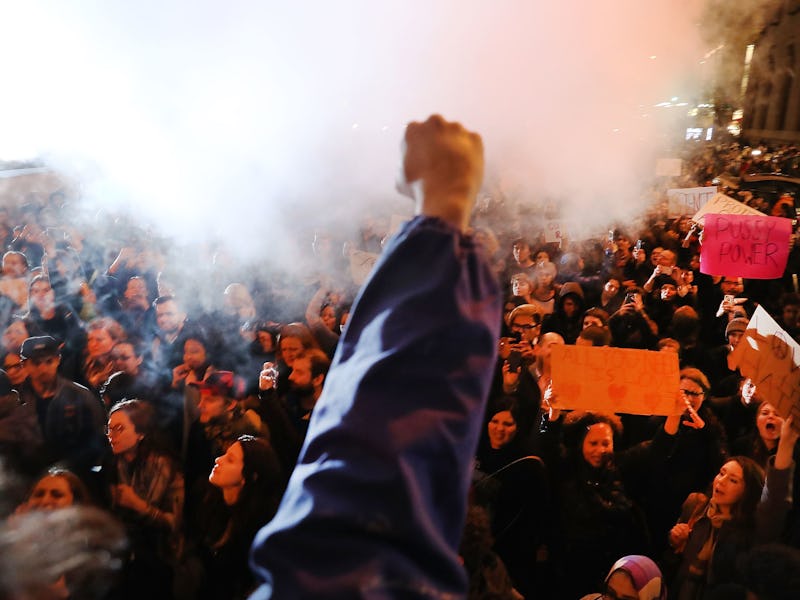The Unexpected Biology of Sad/Angry/Happy Facebook Feeds
Blame cortisol for all the feels.

After an election that shocked the chattering, political, and middle class, Democrats in blue states are grieving publicly, wearing black, looking for someone to blame, and asking unanswerable questions. Though the emotional reaction on the American left is credible, it may not be entirely the product of the election results. Post-election stress is exacerbating an already extreme backlash.
“At the base, we need to understand that stress is an adaptive construct,” Robert-Paul Juster, a researcher with the Centre for Studies on Human Stress in Montreal and a neuroscientist at Columbia University, told Inverse. “We wouldn’t have been able to fight or flee from predators without a stress response.”
That stress is actually a biological mechanism, one that Juster refers to by a memorable acronym: NUTS. It’s a response to something new, elicits unpredictability, is a threat to our sense of self, and feels like a loss of a sense of control. Juster, who focuses his research on stress in minority populations, says the current conditions are ripe for this response. He also claims that the particular dynamics of stress responses can explain the varied reactions people are seeing right now in their social media feeds.
This may explain why so many people around the country have spent the last two days vacillating between sadness and anger. Stress triggers the release of cortisol, which in turn catalyzes the digestion of fats into sugars, which can be burned quickly in an emergency. Cortisol helps people process information faster, but it also the main ingredient of over-reactions.
Cortisol also affects the immune and digestive system while interfering with the creation of new memories. It could explain why — regardless of how you voted in the election — you may have recently lost your appetite, forgotten why you entered a room, and felt like crying constantly.
“It’s the reason why stress is related to so many different health conditions,” Juster says, predicting that there’s going to be an uptick in people who feel sick for the rest of the week. What’s less predictable, he adds, is how different populations will react to stress.
“Generally, men react more strongly to stress involving performance, while women react more strongly to stress that comes with social rejection,” Juster explained. To prove this he measured diurnal cortisol from saliva samples throughout the day from male and female subjects. He argues that this is why so many women are expressing such frustration and utter grief on your social media feed: They feel that society has turned against them, not just that they’ve somehow failed personally so much as an entire group of people have rejected their right to exist. Men, on the other hand, are more likely to bottle it in if they’re Hillary supporters; again, society looks down upon the crying, grieving man, and while they might feel a catch in their throat, their stress isn’t a reaction to identity so much as feeling crappy about losing.
There’s also a significant difference between gays and lesbians in how they react to stress, according to research Juster has done with the community. Compared to heterosexual women, lesbian and bisexual women showed higher cortisol reactions within 40 minutes of a stressful event.
But what stands out is the fact that gay and bisexual men in Juster’s study showed cortisol levels similar to heterosexual women. This means that when it comes to stress, heterosexual women — who have higher stress levels and react to them more than heterosexual males — actually display less stress than their homosexual counterparts, least of all gay men. And while we’ve come a long way in accepting gays and lesbians into everyday life, the prospect of an administration that is openly hostile to the plight of minorities — sexual, racial, and religious — is cause for a stress-induced anxiety attack for these populations.
Those in LGBT communities, in other words, already face a lot of stigma in society that contribute to higher cortisol levels in reaction to a stressful event. With something as shocking as the election of Donald Trump to the highest office in the land, many of their cortisol levels are probably spiking — and that’s only if an LGBT person has come out of the closet. If they haven’t, well, those cortisol levels are going to potentially admit a person to a hospital from stress.
Juster, for his part, said that his colleagues in the mental health community have been on the phone nonstop with clients who are stressed to the point of sickness. “People are distraught,” he said. “A lot of people aren’t sure what’s next.” And that’s stressful.